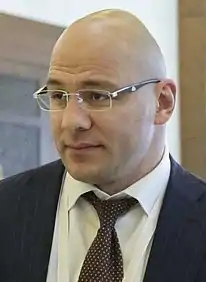Artur Taymazov
Artur Taymazov (Ossetian: Таймазты Барисы фырт Артур; Russian: Артур Борисович Таймазов; born 20 July 1979) is Uzbek-Russian wrestler and politician. He was Uzbekistan's most decorated Olympian before being stripped of two gold medals for doping.[1] In 2016, he was elected to the 7th State Duma of the Russian Federation representing United Russia.[2]
 | |||||||||||||||||||||||||||||||||||||||||||||||||||||||||||||||
| Personal information | |||||||||||||||||||||||||||||||||||||||||||||||||||||||||||||||
|---|---|---|---|---|---|---|---|---|---|---|---|---|---|---|---|---|---|---|---|---|---|---|---|---|---|---|---|---|---|---|---|---|---|---|---|---|---|---|---|---|---|---|---|---|---|---|---|---|---|---|---|---|---|---|---|---|---|---|---|---|---|---|---|
| Native name | Артур Борисович Таймазов | ||||||||||||||||||||||||||||||||||||||||||||||||||||||||||||||
| Full name | Artur Borisovich Taymazov | ||||||||||||||||||||||||||||||||||||||||||||||||||||||||||||||
| Nationality | Russian | ||||||||||||||||||||||||||||||||||||||||||||||||||||||||||||||
| Born | 22 July 1979 Nogir, North Ossetia-Alania, Russian SFSR, Soviet Union | ||||||||||||||||||||||||||||||||||||||||||||||||||||||||||||||
| Height | 1.90 m (6 ft 3 in) | ||||||||||||||||||||||||||||||||||||||||||||||||||||||||||||||
| Weight | 120 kg (265 lb) | ||||||||||||||||||||||||||||||||||||||||||||||||||||||||||||||
| Sport | |||||||||||||||||||||||||||||||||||||||||||||||||||||||||||||||
| Country | Uzbekistan | ||||||||||||||||||||||||||||||||||||||||||||||||||||||||||||||
| Sport | Wrestling | ||||||||||||||||||||||||||||||||||||||||||||||||||||||||||||||
| Event(s) | Freestyle | ||||||||||||||||||||||||||||||||||||||||||||||||||||||||||||||
| Club | Dynamo Tashkent | ||||||||||||||||||||||||||||||||||||||||||||||||||||||||||||||
| Coached by | Salim Abduvaliev Akhrol Ruziev | ||||||||||||||||||||||||||||||||||||||||||||||||||||||||||||||
| Achievements and titles | |||||||||||||||||||||||||||||||||||||||||||||||||||||||||||||||
| Olympic finals | 2000, 2004, 2008, 2012 | ||||||||||||||||||||||||||||||||||||||||||||||||||||||||||||||
Medal record
| |||||||||||||||||||||||||||||||||||||||||||||||||||||||||||||||
Artur Taymazov | |
|---|---|
| Member of the State Duma from North Ossetia-Alania's North Ossetia constituency | |
| Assumed office September 2016 | |
On 5 April 2017, it was announced that as a result of retesting samples he had been disqualified from the 2008 Olympics for a drug violation, and his gold medal was withdrawn.[3] On 23 July 2019, it was announced that as a result of retesting samples he had been disqualified from the 2012 Olympics for a drug violation, and his gold medal from that event was also withdrawn.[4] As both of his gold medlas were re-allocated to Russian wrestlers, Taymazov said he was nonetheless happy to "bring" two golds to Russia.[5]
Early life
In childhood, he was doing weightlifting but when he turned 11, a freestyle wrestling club opened in his village and he decided to wrestle. His older brother Tymur Taymazov was a 1996 Olympic Games champion in weightlifting, competing for Ukraine.
Olympics
2000 Sydney Olympics
Making his Olympic debut in Sydney in 2000, he won Uzbekistan's first Olympic wrestling medal in the 130 kg weight class, losing to Russian David Musul'bes in the final.
2004 Athens Olympics
In the 2004 Games in Athens he became Uzbekistan's first multiple-medalist after winning gold in the 120 kg weight class.
2008 Beijing Olympics
He successfully defended his 120 kg title in Beijing four years later, this time defeating Musul'bes in the semifinals, winning 3–0, 1–0 in the final against Russian Bakhtiyar Akhmedov. After his second olympic title in Beijing, he was honored in his country by the Buyuk Hizmatlari Uchun Order[6] ("For Outstanding Services").
His urine sample was retested in 2016, and he was found to be taking a banned substance. Taymazov was stripped of his medal with his 2008 results disqualified.[7]
2012 London Olympics
At the 2012 Games in London, he won his third consecutive Gold Medal by beating Davit Modzmanashvili of Georgia in the final 2–0.
The athlete's page which introduced Taymazov, his height was wrongly shown as 1.75 m, but his actual height was 1.90 m.[8]
On 23 July 2019, it was announced that as a result of retesting samples, Taymazov had been disqualified from the 2012 Olympics for a drug violation, and his gold medal from that event was withdrawn.[4][9]
Politics
He is a member of the State Duma since 2016, representing the North Ossetia constituency.
Sanctions
Sanctioned by Canada under the Special Economic Measures Act (S.C. 1992, c. 17) in relation to the Russian invasion of Ukraine for Grave Breach of International Peace and Security.[10] and by the UK government in 2022 in relation to Russo-Ukrainian War.[11]
References
- "Uzbekistan wrestler Artur Taymazov stripped of gold medal from 2012 London Olympic Games over doping". Firstpost. 24 July 2019. Retrieved 8 July 2020.
- В Госдуму прошел одномандатник из Северной Осетии Артур Таймазов (in Russian). Regnum. 19 September 2016.
- "IOC sanctions three athletes for failing anti-doping test at Beijing 2008 and London 2012". IOC. 5 April 2017. Retrieved 5 April 2017.
- "IOC sanctions one athletes for failing anti-doping test at London 2012". IOC. 23 July 2019. Retrieved 23 July 2019.
- "Артур Таймазов: золота было много, но свой максимум так и не раскрыл - РИА Новости Спорт, 28.12.2018".
- (in English) Uzbekistan Airways Inflight Magazine, n°4/2008, p54-55.
- "Iran's Ghasemi new gold medalist of 2012 Olympics". Tehran Times. 11 November 2020.
- Evans, Hilary; Gjerde, Arild; Heijmans, Jeroen; Mallon, Bill; et al. "Artur Taymazov". Olympics at Sports-Reference.com. Sports Reference LLC. Archived from the original on 17 April 2020.
- "Artur Taymazov stripped of London 2012 gold for doping offence". BBC Sport. Retrieved 24 July 2019.
- "Special Economic Measures (Russia) Regulations (SOR/2014-58)". Retrieved 24 June 2023.
- "CONSOLIDATED LIST OF FINANCIAL SANCTIONS TARGETS IN THE UK" (PDF). Retrieved 16 April 2023.
External links
- Artur Taymazov at the International Wrestling Database (alternate link)
- Artur Taymazov at Olympics.com
- Artur Taymazov at Olympedia
- "Artur Taymazov at London2012.com". Archived from the original on April 2, 2013. Retrieved August 11, 2012.